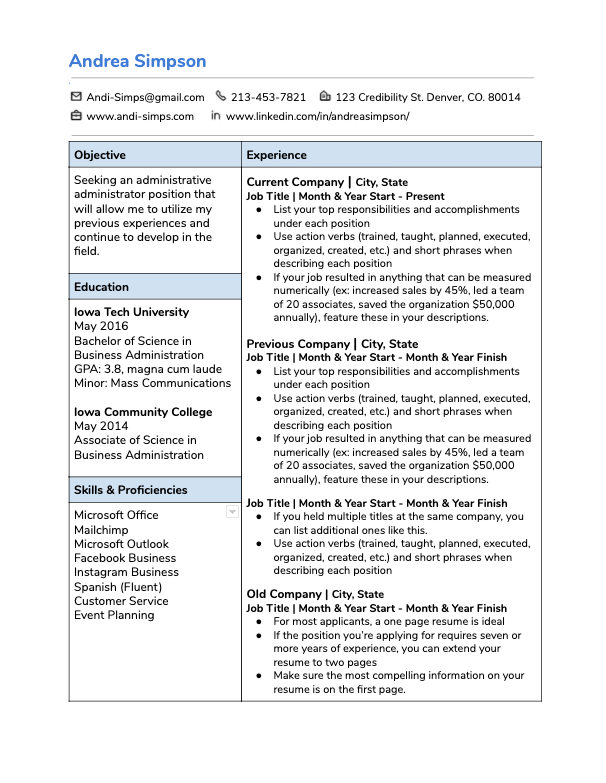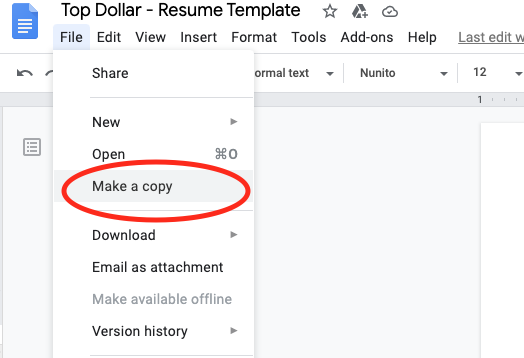Job hunting can be a long and intimidating process. In addition to searching through job postings and filling out lengthy applications, you have to make sure your resume is strong enough to stand out from hundreds of other applicants. Although the writing and updating process takes time and effort, submitting a professional and polished resume can greatly increase the chances that you’ll be granted an interview.
Why You Need a Resume
Think of resumes as marketing tools. This one- or two-page summary of your education, experience and skills serves as an advertisement to hiring managers. The product that they need, according to your resume, is you.
Your resume is usually the first impression that employers have of you. It’s important to submit a thoughtful and well-polished resume (along with a well-written cover letter) so that you can stand out. Your ultimate goal is to create a compelling, clear document that encourages employers to reach out and interview you for your desired position.
Formatting Basics
Your resume’s specific look and feel will vary greatly depending on your industry and level of experience. These universal guidelines can be used to set up your document:
- Margins: Between 0.5’’ and 1.5’’ (aim for 1’’)
- Font: Stick with basic and professional fonts like Helvetica, Georgia, Calibri, Verdana, Times New Roman, Ariel, Courier New, Garamond and Didot. Aim to use the same font throughout the document. Use italics, underlined text or bolded fonts to distinguish headlines.
- Font Size: While font sizes can vary throughout your resume, aim to make the text no smaller than 12-point. Use 14 to 16-point on headlined text.
- Spacing: Single
- Alignment: Rely on left alignment for most or all of your text. You may choose to use center alignment for some sections and headers for stylistic purposes – if you do, make sure it doesn’t affect your resume’s readability.
- Length: For most applicants, a one page resume is ideal. If the position you’re applying for requires seven or more years of experience, you can extend your resume to two pages. Make sure the most compelling information is on the first page.
- File Format: Unless otherwise specified, save and send your resume as a PDF file. If a .doc file is requested, make sure to save it as a true .doc file rather than a .docx file.
Basic Content Breakdown
Depending on your experience level, industry and job history, your resume may vary greatly from other job seekers’ resumes. Most resumes will include the following:
Contact Information: Include your name, email, address and primary phone number in your resume’s header. If you have a professional website or a LinkedIn profile, this is also a good place to list them.
Education: At a minimum, list the schools you attended and the degrees you received. While not required, it can help to include your major, the year you graduated and if you graduated with a minor or honors. You can also include your GPA if it was particularly impressive (think 3.5 or higher), but it’s definitely not a requirement.
List of Experience: List the positions you have held and the companies you have worked for. Full-time jobs, part-time jobs, internships, volunteer experience, summer jobs and freelance work can all be included here. This does not need to be a full list of every job you’ve ever held! While those with less experience may include their full employment history, individuals who have more work experience should only list positions and experiences that are most relevant to the jobs they are applying for. Include the city and state that you worked in, as well as the month and year you started and the month and year you ended. If you’re still working in a particular position, you can list “present” in place of an end date.
Create a list that highlights your top responsibilities and accomplishments under each listed position. Use action verbs (trained, taught, planned, executed, organized, created, etc.) and short phrases when describing each position. If your job resulted in anything that can be measured numerically (ex: increased sales by 45%, led a team of 20 associates, saved the organization $50,000 annually), feature these in your descriptions.
Skills and Proficiencies: Are you fluent in multiple languages? Are you skilled in using a particular software that’s listed on the job posting? Do you have useful certifications, such as American Red Cross CPR or First Aid? Highlight any relevant skills and proficiencies in a specific section on your resume.
Optional (But Helpful) Additions
While these sections aren’t required, you may choose to include the following:
Objective: This is a quick statement about who you are and the kinds of positions you are seeking. Including an objective can be especially helpful if you are new to the job market, applying for jobs in a new industry, or moving to a new location. Here are some examples for inspiration:
- “I am a recent fashion merchandising graduate seeking a full-time position as an assistant buyer.”
- “I am an experienced math teacher relocating to St Louis in August, seeking a position at Washington Middle School where I can help increase student performance and share my passion for the subject.”
- “Dedicated marketing professional with four years of experience in the beauty industry. Seeking opportunities to use my writing and social media skills in the nonprofit sector.”
Honors and Awards: If you have additional space and have received awards and awards that are relevant to the job you’re applying for, include them on your resume. This section can be especially helpful for current students or recent graduates who may not have as much work experience to share.
Relevant Certifications: If you have received any relevant and industry-specific certifications that were earned outside of high school or college, you can list them in a special section on your resume. Include the certification title, the organization that awarded it to you, and the date you received it (or will receive it).
The Biggest Rules of Resume Writing
One of the worst mistakes you could make when creating your resume is to lie about your previous work experience or abilities. It’s easy for hiring managers to catch lies during the interview process, which can damage your reputation.
Another big mistake, while less morally questionable than lying, is to submit a resume riddled with typos. Be sure to check for spelling and grammatical errors. It can be helpful to ask a colleague or a writing-savvy friend to review it before you send it in.
When Resumes Vary – Consider the Job and Industry
Hiring managers from creative industries may value your personal brand and artistic eye. Those from data-driven or analytic fields may prefer a clean-cut list of your abilities without additional flair. The appearance and content of your office manager resume, for example, will be incredibly different from your friend’s data analyst resume and your cousin’s graphic design resume. To get a better idea of your industry’s preferred style, check out Monster’s extensive list of resume examples. You can also consult with your college’s career center, mentors and colleagues for additional insight.
Get Started With Our Resume Template
Top Dollar has created a basic resume template that’s free to view and easy to use.

Our copy is locked for editing, but you can save your own version to use as you wish. Simply click “File” and “Make a Copy” in the upper left hand corner to save an editable file.

Don’t stop once you’ve completed your resume – be sure to brush up your cover letter next!
Good luck with your job search!
